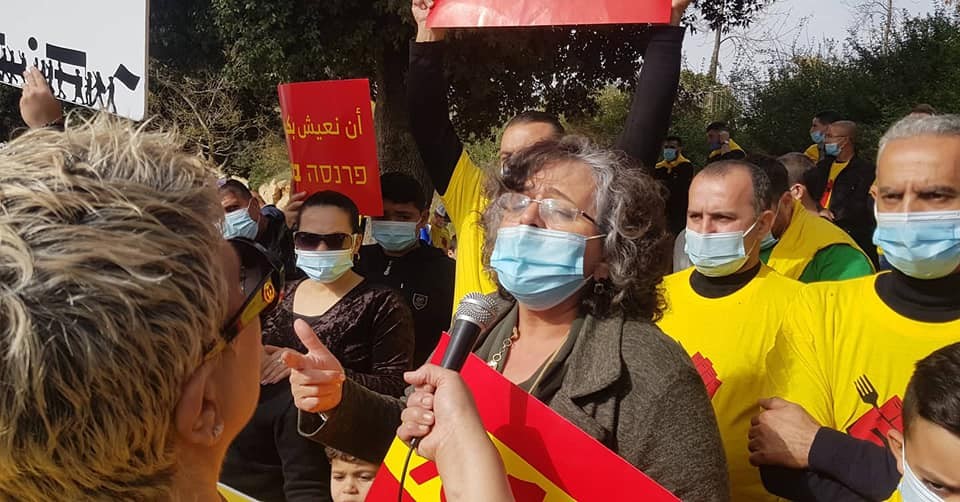The following article by Hadash MK Aida Touma-Sliman (Joint List) was first published by The Morning Star.
Touma-Sliman is a leading member of the Communist Party of Israel.
Last week the Israeli Knesset was dissolved leading the country toward its fourth election cycle in two years this March. The elections, in the midst of the COVID-19 pandemic and the economic crisis, could mark the end of Benjamin Netanyahu’s 11-year premiership. The possibility of defeating the right wing is not great, but the possibility of Netanyahu leaving office just after Donald Trump could outline a new regional reality we have to prepare for.

MK Aida Touma-Sliman, last week, during a demonstration of restaurant owners and workers near the Knesset in Jerusalem (Photo: Zo Haderech)
Trump’s four years in power left the struggle for Palestinian independence and for peace in the region in dire straits. For four years we have witnessed a co-ordinated effort by the most reactionary right-wing forces in both the US and Israel to marginalize the Palestinian demand for freedom, to normalize and legalize the illegal settlement project, and to enact de facto annexation of the West Bank.
This was the obvious aim of Trump’s “Deal of the Century” — which was implemented aggressively in the past four years. The long list of provocative steps made by Israel and the US, including moving the US embassy to Jerusalem and the administration’s statement that the US does not consider the settlements to be illegal, to name a couple — have passed without considerable international resistance. The international community did not rise up against these violations of international law and left the Palestinians alone facing the menacing Israeli and US steps.
The latest normalization and arms trade deals Israel has reached — with the UAE, Bahrain, Sudan and Morocco — should be analyzed in light of the imminent end of Trump’s presidency in January. The outgoing president and the Israeli PM, by creating facts on the ground, wish to make the incoming US administration face a new regional reality — in which the question of normalizing Israel’s position in the Arab and Muslim world is decoupled from the Palestinian issue.
This new reality erodes the formula shared by both the Arab Peace Initiative and the Palestinian leadership — according to which one of the main incentives Israel can gain from ending the occupation and the establishment of a Palestinian state is full normalization in the region. Unfortunately, the treaties signed between Israel and the Arab states have made clear this equation is losing its relevance. The Israeli government and US administration — as well as the regimes in the Gulf — want to divert international attention from the Israeli occupation toward the tensions between Iran and the Arab states. This shift of attention from the occupied Palestinian territories to Tehran — as the main contradiction in the region — serves Riyadh as well as Jerusalem.
Biden’s Administration
The Biden administration will probably mark a return to the pre-Trump norms.
This shift is not at all, what we on the left have hoped for, but it is still a vast improvement from Trump’s destructive policy in the region.
We can be glad about Trump’s departure from the White House even if Biden’s entrance in his place is not a reason for celebration.
Pro-Israeli bias has always been a feature of US intervention in the conflict, but during Trump’s term, the position was clearly aligned with the Israeli far right. We can expect the Biden administration to tilt the position a bit away from the settlers, but in no way toward the Palestinians.
While the pro-Palestinian progressive voices are becoming stronger in the Democratic Party, there is no indication Biden will adopt any of their positions such as placing conditions on aid to Israel or taking decisive action against settlements. On the other hand, we can expect a stark difference in the US administration’s position on Iran. The US will probably soon rejoin the Iran peace deal (JCPOA) and deescalate the regional tensions.
Yet we must be vigilant until Biden takes office on January 20: Netanyahu, Trump and their Gulf allies will make any effort possible to put a stick in the wheels of Biden’s re-engagement by making reality even more complicated. A prelude to these disruptive moves was the illegal Israeli assassination of a prominent Iranian nuclear scientist a few weeks ago. Israel will make any effort to escalate the situation before Biden takes office, even if it might lead to war.
The post-Trump era will be an opportunity to slow down the dangerous processes led by the Israeli right — the obliteration of the two-state solution and the de facto annexation. But the damage of the past four years is done, and it’s bad.
Here in Israel, we are heading toward a new election cycle — and it seems as if the Palestinian issue is nowhere to be found. Our job in the Joint List and the left is to bring the occupation back to the fore — to reclaim it as the main contradiction in our reality and the main challenge for a peaceful Middle East.
Any new Israeli government led by Netanyahu or not, will need to be put under pressure on this issue. To that effect it is crucial that the international community take decisive action against the occupation, including the recognition of the state of Palestine and rejection of the settlements as violations of International law.
The left needs to fight back against the reality in which accusations of anti-Semitism are brought up every time criticism against the occupation is raised, and to revive the discussion on Palestine in terms of international law and pressure on those who violate it. The struggle continues in Israel, Palestine and the entire world.


